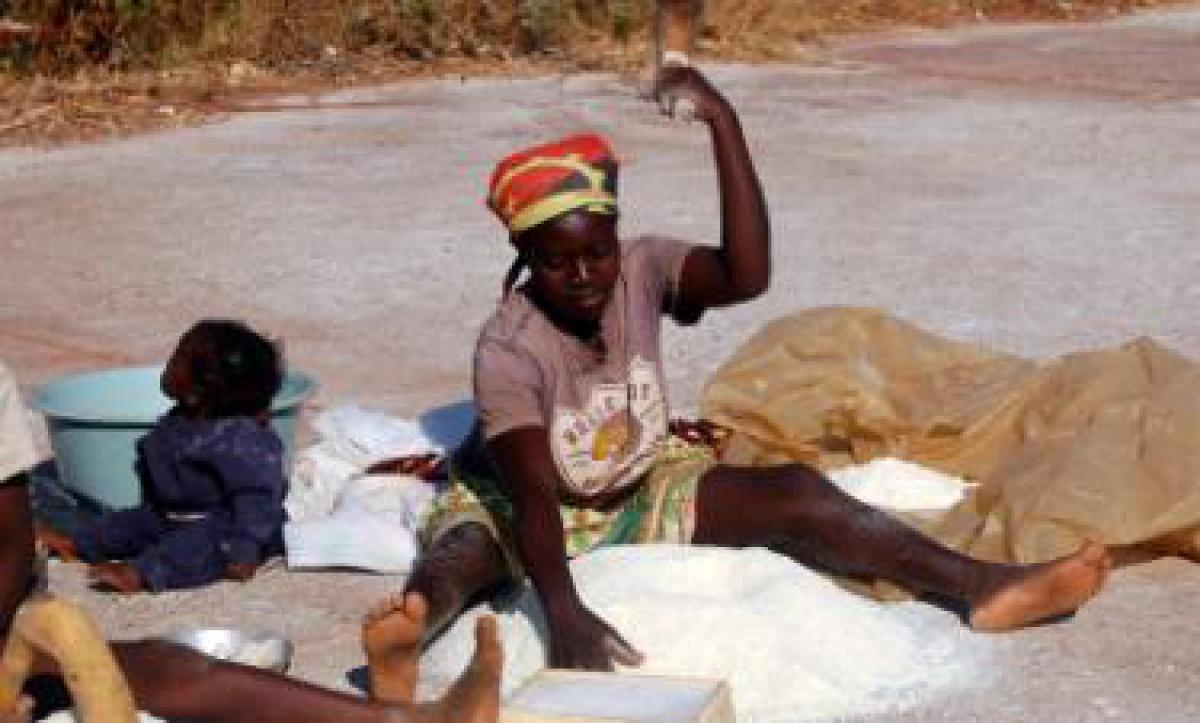What do people eat in Angola?
Diet
The traditional diet in Angola is influenced by its diverse cultural heritage and availability of local ingredients. The country's cuisine reflects Portuguese, African, and indigenous culinary traditions. Here are some typical foods and dietary habits in Angola:Staple Foods: The main staple in Angola is funge, a thick porridge made from cassava or cornmeal. It is often served with various accompaniments.
Fish and Seafood: As a coastal country, Angola has a rich seafood culture. Fresh fish, shrimp, lobster, and other seafood are commonly consumed, either grilled, fried, or stewed.
Meat: Angola is also known for its meat dishes, particularly grilled meats. Grilled chicken (frango grelhado) and grilled beef (carne grelhada) are popular choices.
Beans and Rice: Beans, such as feijão de óleo (oily beans), are a common side dish and are often served with rice.
Vegetables: Various vegetables like tomatoes, onions, okra, cabbage, and greens are used in Angolan cuisine. They are often incorporated into stews, soups, or served as side dishes.
Condiments and Spices: Palm oil is widely used in Angolan cooking, giving dishes a distinctive flavor. Other common seasonings include garlic, onions, bay leaves, and various local spices.
Fruits: Angola is abundant in tropical fruits such as bananas, papayas, mangoes, pineapples, and citrus fruits. These fruits are enjoyed fresh or used in juices and desserts.
Street Food: Angolan street food is popular and diverse. You can find snacks like roasted corn, grilled meats, fried fish, and various pastries sold by street vendors.
Beverages: Maize-based drinks, like the locally brewed beer called "cuca," are common. Angolans also enjoy tropical fruit juices, coconut water, and tea.
Mealtime
Cassava is the most important food in Angola. It can be made into flour, bread, tapioca, or even alcohol. Fuba ("Foo-bar") is another popular dish made from cassava. The raw cassava root is poisonous and requires careful preparation before eating. The leaves of the cassava plant are removed and used to make Kizaka ("kiz-AH-ka") a vegetable dish. Besides cassava, millet and corn are staple foods.Fish is also an important source of food. A typical family does not eat meat because it cannot afford it. Only on special occasions is a family-owned chicken or duck killed and eaten. Breakfast usually consists of funje ("PHON-jee") or bread, and a porridge made from cassava. Coffee is a popular drink. Lunch is often quick and informal and may consist of bread and cheese.
The evening meal is the main meal and is usually later when everyone has returned home from work. In rural areas, a popular bread is pao burro ("pow BORE-o") or donkey bread.
Popular Angola Recipes
- Calulu - Main Dish
- Chicken Muamba - Main Dish
- Funje - Bread
- Kizaka - Main Dish
- Mufete de Causo (Grilled Tilapia with Onion and Chilli Sauce) - Main Dish

World Regions
All Countries
Afghanistan
Akrotiri
Albania
Algeria
American Samoa
Andorra
Angola
Anguilla
Antarctica
Antigua and Barbuda
Argentina
Armenia
Aruba
Australia
Austria
Azerbaijan
Bahamas
Bahrain
Bangladesh
Barbados
Belarus
Belgium
Belize
Benin
Bermuda
Bhutan
Bolivia
Bosnia and Herzegovina
Botswana
Brazil
British Indian Ocean Territory
British Virgin Islands
Brunei
Bulgaria
Burkina Faso
Burma
Burundi
Cabo Verde
Cambodia
Cameroon
Canada
Cayman Islands
Central African Republic
Chad
Chile
China
Christmas Island
Clipperton Island
Cocos (Keeling) Islands
Colombia
Comoros
Congo, Democratic Republic of the
Congo, Republic of the
Cook Islands
Coral Sea Islands
Costa Rica
Cote d’Ivoire
Croatia
Cuba
Curacao
Cyprus
Czech Republic
Denmark
Dhekelia
Djibouti
Dominica
Dominican Republic
Ecuador
Egypt
El Salvador
Equatorial Guinea
Eritrea
Estonia
Eswatini
Ethiopia
Falkland Islands
Faroe Islands
Fiji
Finland
France
French Guiana
French Polynesia
Gabon
Gambia, The
Gaza Strip
Georgia
Germany
Ghana
Gibraltar
Greece
Greenland
Grenada
Guadeloupe
Guam
Guatemala
Guernsey
Guinea
Guinea-Bissau
Guyana
Haiti
Holy See
Honduras
Hong Kong
Hungary
Iceland
India
Indonesia
Iran
Iraq
Ireland
Isle of Man
Israel
Italy
Jamaica
Jan Mayen
Japan
Jersey
Jordan
Kazakhstan
Kenya
Kiribati
Korea, North
Korea, South
Kosovo
Kuwait
Kyrgyzstan
Laos
Latvia
Lebanon
Lesotho
Liberia
Libya
Liechtenstein
Lithuania
Luxembourg
Macau
Madagascar
Malawi
Malaysia
Maldives
Mali
Malta
Marshall Islands
Martinique
Mauritania
Mauritius
Mayotte
Mexico
Micronesia
Moldova
Monaco
Mongolia
Montenegro
Montserrat
Morocco
Mozambique
Namibia
Nauru
Nepal
Netherlands
New Caledonia
New Zealand
Nicaragua
Niger
Nigeria
Niue
Norfolk Island
North Macedonia
Northern Mariana Islands
Norway
Oman
Pakistan
Palau
Panama
Papua New Guinea
Paraguay
Peru
Philippines
Pitcairn Islands
Poland
Portugal
Puerto Rico
Qatar
Reunion
Romania
Russia
Rwanda
Saint Helena, Ascension, and Tristan da Cunha
Saint Kitts and Nevis
Saint Lucia
Saint Pierre and Miquelon
Saint Vincent and the Grenadines
Samoa
San Marino
Sao Tome and Principe
Saudi Arabia
Senegal
Serbia
Seychelles
Sierra Leone
Singapore
Slovakia
Slovenia
Solomon Islands
Somalia
South Africa
Spain
Sri Lanka
Sudan
Sudan, South
Suriname
Svalbard
Sweden
Switzerland
Syria
Taiwan
Tajikistan
Tanzania
Thailand
Timor-Leste
Togo
Tokelau
Tonga
Trinidad and Tobago
Tunisia
Turkey
Turkmenistan
Turks and Caicos Islands
Tuvalu
Uganda
Ukraine
United Arab Emirates
United Kingdom
United States (US)
Uruguay
Uzbekistan
Vanuatu
Venezuela
Vietnam
Virgin Islands
Wake Island
Wallis and Futuna
West Bank
Western Sahara
World
Yemen
Zambia
Zimbabwe
